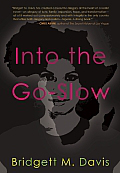Why Is This The First Book I’ve Read from Feminist Press?
INTO THE GO-SLOW by Bridgett M. Davis
I’ve always hated not having a sister and it’s books like Into the Go-Slow that always reconfirm to me just how much I’m missing out. The story of younger sister Angie’s idolization and parallel horrification at her older sister’s behavior provide such a complex sister dynamic, you’re definitely be rolling your eyes the next time someone tells you “Frozen” is such a deep look at sister relationship.
The novel takes off in 1986, and Angie’s older sister Ella has been dead for a few years. Still, there are pieces of Ella that haunt Angie, control the way she lives her life still. For instance, she refuses to leave Detroit, the place her sister spent most of her life, even as her mother and her other older sister opt for a new life in the south. By the time we meet Angie, she’s taking on her older sister’s obsession with Africa, Fela Kuti, even becoming involved with the same men and women Angie spent her time with.
It’s tragic, though, despite Angie’s following in Ella’s footsteps, Ella’s old friends can’t see it. While Ella was the outspoken life of the party, fuel to any environment, Angie is more likely to stand back and soak it all in. And there are the physical differences as well – while Ella was full-bodied, Angie’s thin frame keeps people from making the connection that the two could have been sisters.
It’s around this time that Angie decides she must follow in another one of Ella’s footsteps. She decides she must visit Nigeria, the place were Ella was killed years earlier, hit by a car while crossing the road. Angie is desperate to meet the people who knew Ella closely, who were with her in the moments before her death.
There’s so much at play at this point. Not only is Angie going to find out about Ella, she’s leaving to find out about herself. An obsession with Africa, their forefathers homeland, a passion for the women of Nigeria and a job as a reporter for an independent Nigerian newspaper were what worked to pull Ella out of a downward spiral; Angie hopes diving into the same, tracing the same trails will lead her to discover more about herself. As her mother heartbreakingly tells Angie: “I think there are a lot of ways to be black in this world, and I think you just need to find yours.”
At this point, there’s already so much I have heard about yet know I’ll never understand. Sure, I have an older brother and know what it’s like to follow in another’s footsteps (literally, every time I had the same math/science teacher following my brother, having to explain that I’m better at writing/art as they gave me that look of shock handing back the first assignment), but from all accounts I’ve heard, this is nothing like following a same-sex sibling. People expect you to look the same, to talk the same, to be the same girl. I can’t imagine having my way carved out before me like that.
What makes it even more complex for Angie is that, despite Ella’s success and joy as a writer during the last few years of her life, so much of her life was spent addicted to drugs, battling the demons of addiction. For so long, Ella was no one to look up to, and even a young Angie realized this. Despite the horrible things her sister would do while high, though, Angie would never distance herself. Of course she saw the flaws and harm Ella’s actions had on the rest of the women in the family, yet, it seems Angie would rather bury that Ella, keep the memory of the thriving, wise Ella in Africa alive only.
And then, there’s the tension of being black in America. That line the mother said really stuck with me: “There’s a lot of ways to be black in this world.” As a white person, I don’t think I’ve ever actually taken a minute to think about what kind of white person I should be. As with most whites, I have a vague pride in my national heritage, but have never truly felt defined or discriminated against because of it.
And then my curiosity is peaked – what are the ways to be black in this world? It seems, coming from this novel, there’s to take on your skin color, to delve into the history and current circumstances of your people, to really connect with your African roots; or to try to move past the racialization of everything, to try your damnedest to live in a colorblind world despite it all, as Angie’s mother and middle sister do. Are these the choices? I’ll never know. Privileged as I am with my white skin, I will never truly have to understand what it means to be black in America, in the world, in life.
Basically this: Into the Go-Slow will teach you something, give you a meaty story about how a person should be no matter their skin color, origins, or past.






